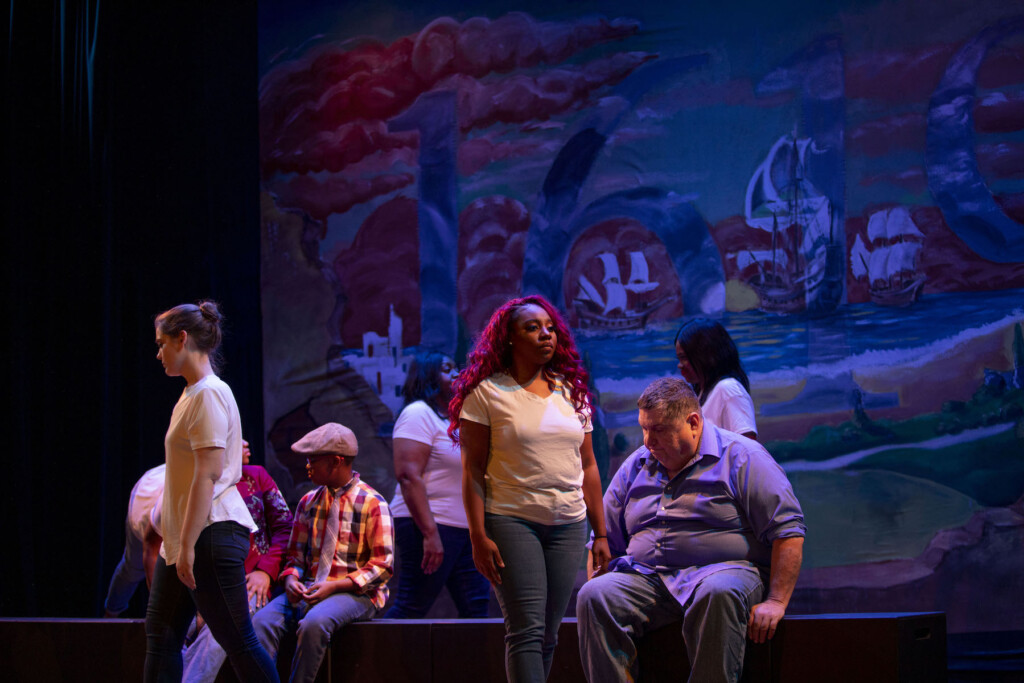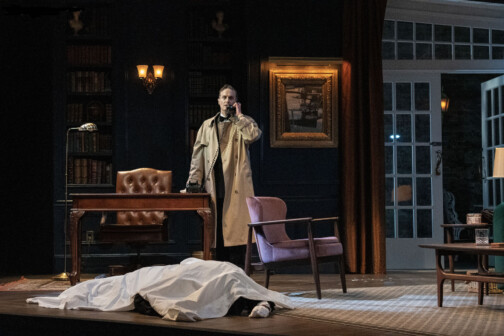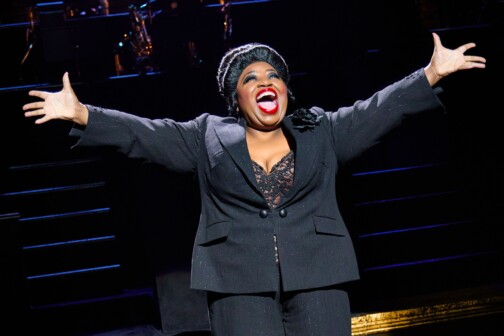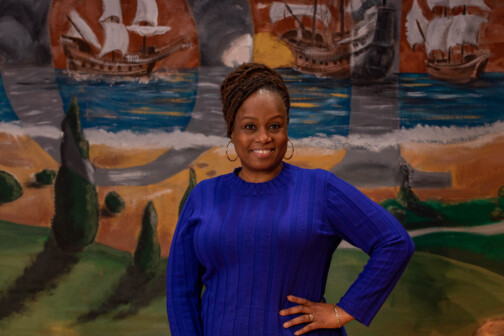Behind the metal and glass doors, past the lobby that doubles as an art gallery, about 10 actors were onstage at the Bishop Arts Theater hugging and high-fiving. The winter storm delayed this rehearsal, but the show will still go on, starting February 11. There is still much work to do.
Gabrielle Kurlander, wearing black pants and a maroon sweater a few shades darker than her red hair, is leading her cast through a difficult transition. She paces a few beats, offers some cues for the actors, and sinks into a chair in the front row.
Each of the 10 actors takes a seat on black boxes spanning the stage. They pause for a moment then exit, leaving just three women and two children. The women, wearing white shirts and jeans with blue silk cloths, crowd the children. The music fades. A child wearing blue jeans and a red sport coat with a matching red hat turns toward the mural backdrop, where the date “1619” is painted.
“What is 1619?” the child asks.
One of the women bursts into song, her voice full of emotion. Soon the other women join in harmony, singing, “hatred of darkness is the American way” while pointing to their brown arms in near-perfect syncopation.
“Good!” Kurlander says. “Let’s try that again.”
They were rehearsing a piece for the Bishop Arts Theatre Center’s 1619 One Act Play Festival, which takes inspiration from the Pulitzer Prize-winning 1619 Project. The festival features nine one-act plays no longer than 20 minutes and runs throughout Black History Month, wrapping up on Feb. 26. Each play was written by one of nine local and national playwrights, with Nikole Hannah-Jones’ book, The 1619 Project: A New Origin Story, serving as inspiration.
Kurlander hopes it will spark a dialogue within the community surrounding difficult questions about race, investment, and life in Dallas.
“I want people to walk away from the 1619 One Act Play Festival with hope,” Kurlander said. “We can turn our struggle into strength, and we can turn limitations into love.”
Hannah-Jones’ 1619 endeavor was first published in The New York Times Magazine in August 2019. The goal was to reframe American history by placing the consequences of slavery and the contributions of Black Americans at the center of the American narrative. The project eventually expanded into a 1619 podcast, a book, and a show on Hulu.
Teresa Coleman Wash, Bishop Art’s founder and executive director, started tossing around the idea roughly a year ago during the theater’s “How to Be Project: Ten Plays for Racial Justice” series, which shared a similar structure. Coleman Wash saw the community’s response and conversation around that effort and saw the potential for more.
“We are in the business of trying to change people’s hearts,” Coleman Wash said in her office at Bishop Arts Theatre. “It doesn’t happen overnight. We are planting seeds. We are not an escapist theater. Given the position that we are in, it is our responsibility to at least try and change people’s hearts.”
Kurlander is also the CEO of the All Stars Project, a national nonprofit that provides after school development opportunities for young people in communities that have suffered from disinvestment and a lack of resources. She moved to Dallas from New York in January 2021 with experience in political theater. Coleman Wash approached her last year with the idea to do something in 2023 during Black History Month.
“She gets us,” Coleman Wash said. “She’s doing exactly the work we are doing but for her communities in New York. So, I just knew she’d be the right person for the job.”
Kurlander worked alongside the political activist and psychologist Lenora Fulani when she was in New York. Fulani was the first Black person to be on the presidential ballot in all 50 states and spent much of her life developing youth programs around New York.
During the director’s early years in community organizing, Fulani took Kurlander under her wing, inviting her into communities like Harlem. There, they had difficult conversations surrounding race and America’s history of oppression.
“[Fulani] and other African American women would say to me ‘as a young White woman, you know, you have a lot to learn, but we want you here. We want you to be part of changing things,’” Kurlander said.
These conversations led to participating in political theater in New York, an experience she has channeled for this first-of-its-kind 1619-inspired play festival in Texas. She knows what’s at stake: Hannah-Jones’ book has met severe pushback from the state leaders in the Republican party.
In September, Texas state government officials approved what became known as the Texas 1836 Project, a pamphlet that will be given to new Texas drivers in direct opposition to The 1619 Project. Critics of the Texas 1836 Project have cited its failure to hold the history of Texas institutions accountable for slavery and different forms of oppression.
Hannah-Jones is one of those critics; she tweeted that states like Texas are “banning teaching that centers slavery and truthfully recounts our nation’s racist past.”
“This isn’t just about Black history, it’s American history and how the legacy of slavery is engrained in the DNA of our country,” Coleman Wash said. “The responsibility of the artist is to reflect the times. In these plays, that’s what you see. That’s the beauty of this festival.”
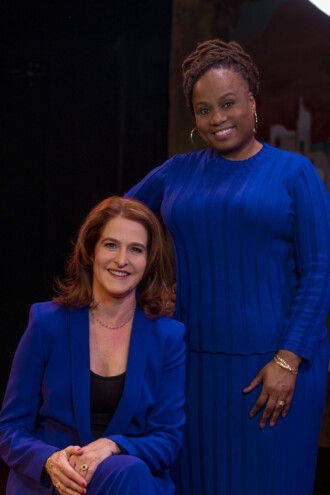
Each of the nine plays takes inspiration from 1619, but they explore ideas thematically. It is not a direct rendering of the book’s chapters. Two of the nine that stick out to Kurlander are Anyika McMillan-Herod’s “They Will Not be Butchered,” and Erin Malone Turner’s “Ingrained.” Uniting both is the power of liberation and the tenacity of the human spirit, she said.
“They Will Not be Butchered” examines what a revolution looks like at its genesis through the eyes of children in Haiti. “Ingrained” parses out what history looks like to those who can only look back and learn of its effects in the future.
“We are looking at brutality, but we are expressing our humanity,” said McMillan-Herod, a fourth-generation Dallasite and executive director of Soul Rep Theater. “I try to find a bit of hope and our humanity because that resilience – the fact that we are still here, generations later – still astounds me.”
The full collection of plays speaks to a larger message of oppression, Kurlander said. The festival attempts to invoke a sense of belonging by reminding people that “everyone is, in fact, someone.”
This is heard in the music, “Who Made all the Lies Fit,” which Kurlander referenced as a large part of the festival.
Written by Fred Newman, with music composed by Annie Roboff, the song asks the audience: “who named them Black riots? Who made all the lies fit? Who wrote up the story? Who stole all the glory? Who sat on the jury? It wasn’t you and I.”
All of those involved hope the plays create conversations that could lead to action by examining the past.
“Theater doesn’t just give you one answer,” Kurlander said. “It gives you a multi-point perspective. And so, with theater, you communicate through dance and movement, and through visuality and imagery, as well as through words and people’s emotions. You touch every aspect of the human spirit, and that moves people in a different way.”


